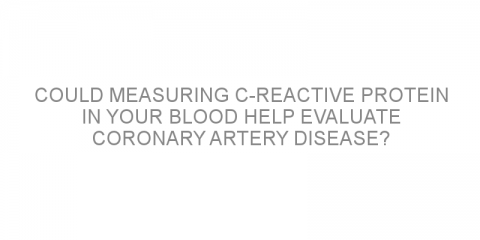In a nutshell This study investigated what antiplatelet drugs are most effective and safe for preventing stroke in patients with cardiovascular disease or who have a history of stroke. Some background A stroke is a disturbance of blood flow to a part of the brain. Most strokes are caused...
Read MoreCoronary artery disease Posts on Medivizor
Can lifestyle changes prevent coronary artery disease from recurring?
In a nutshell This study investigated whether lifestyle changes such as not smoking, reducing weight, increasing physical activity, and maintaining a Mediterranean diet prevents coronary artery disease from recurring in patients who previously had coronary artery disease. Some background Coronary artery disease is a condition that...
Read MoreIs vorapaxar effective in managing atherosclerosis?
In a nutshell This study examined the safety and effectiveness of the drug, vorapaxar (Zontivity), in reducing the risk of complications caused by atherosclerosis. Some background Atherosclerosis is the build-up of cholesterol, fat, and calcium as plaques in the walls of arteries. The plaques can rupture when there are sudden changes in...
Read MoreAlirocumab – an effective drug for treating cardiovascular disease?
In a nutshell This study investigated whether alirocumab (Praluent) is effective and safe in treating patients with cardiovascular disease. Some background Cardiovascular disease includes a range of diseases that causes blood flow to the heart, brain or body to be reduced. Bad cholesterol (low-density lipoprotein (LDL) cholesterol) and fatty...
Read MoreShould heart attack patients have all diseased arteries treated, or just the main culprit?
In a nutshell This study looked at heart attack patients who had more than one heart artery blocked (multivessel coronary disease) and investigated whether is was safer to surgically treat all of the blocked arteries or only treat the main artery causing the heart attack. Some background A heart attack occurs...
Read MoreCalling for patients undergoing percutaneous coronary intervention to test new drug regimen
In a nutshell This phase 2 trial located in the United States aims to assess whether a tirofiban (Aggrastat) regimen of high dose amount plus a shortened infusion duration in patients undergoing percutaneous coronary intervention is better. The outcome to be measured are events such as a heart attack, major bleeding , death or urgent additional...
Read MoreAre drug-eluting balloons the new favorite treatment for small diseased coronary arteries?
In a nutshell This study compared the effectiveness and safety of paclitaxel drug-eluting balloon with paclitaxel drug-eluting stent in patients with coronary artery disease. Some background Balloon angioplasty and stenting is a surgery carried out on patients with coronary artery disease. Coronary artery disease refers to a...
Read MoreMetabolic syndrome and coronary artery disease – partners in crime?
In a nutshell This study investigated whether having metabolic syndrome increases the risk of heart-related death in patients with coronary artery disease. Some background Metabolic syndrome is a combination of conditions including increased blood pressure, high blood sugar, excess body fat, and abnormal cholesterol levels that occur...
Read MoreWhat is obesity doing to your heart?
In a nutshell This study investigated what changes obesity causes to the heart tissue that may explain why obesity leads to heart problems such as impaired blood flow in the heart and heart failure. Some background Obesity is a disorder where a person is significantly overweight due to an excessive amount of body fat. Obesity causes a number of...
Read MoreLooking for patients to evaluate a drug for stroke or heart attack risk reduction
In a nutshell This phase 3 trial located in the United States aims to evaluate the effectiveness of bococizumab (RN316) in reducing cardiovascular events such as a heart attack or stroke. The outcome to be examined is the occurrence of cardiovascular events. The details Bococizumab is a new drug being developed to...
Read MoreCould measuring C-reactive protein in your blood help evaluate coronary artery disease?
In a nutshell This study investigated whether a protein found in blood called C-reactive protein (CRP) is associated with plaques seen in coronary artery disease. Some background Coronary heart disease is a condition that occurs when the arteries that supply the heart muscles with blood (coronary arteries) become narrowed. This...
Read MoreCan stem cells help treat coronary artery disease and heart failure?
In a nutshell This study evaluated whether stem cell therapy is safe and effective for treating coronary artery disease and heart failure. Some background Coronary artery disease (also known as ischemic heart disease) is a condition that affects the blood supply to the heart. It occurs when blood vessels become narrowed or blocked due to...
Read More














